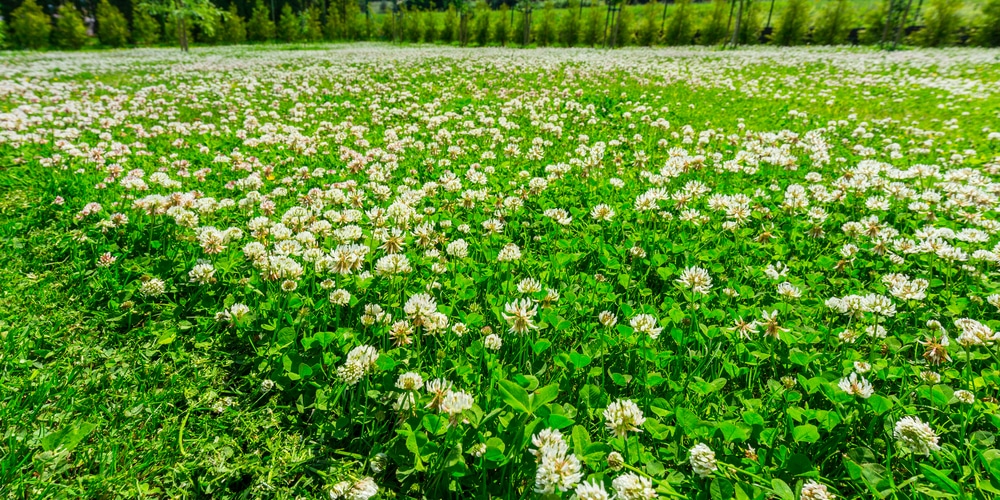Having a spread of clover spring up in your yard seemingly overnight may seem auspicious, but the reasons are far more ordinary than you’d think.
So why do I have so much clover in my yard? Let’s find out the causes and solutions to eliminate clovers on your lawn.
What are Clovers?
The clover plant is an herb that sports the infamous curved foliage and leaves that usually come in threes per stem. You may have heard of the four-leaf clover, which is associated with luck and good fortune- it’s actually uncommon and appears in one out of ten thousand plants.
Clover blooms with white or pink flowers throughout the spring and summer months.
Yard owners, however, will want to remove clovers as soon as they spot a patch of them in their turf as it can compete and invade grass, as well as take away nutrients intended for your lawn.
Why is Clover Taking Over My Lawn?
There are several reasons why clovers keep springing up all over your yard:
- Mowing your grass too short
- Poor nitrogen levels
- Too much water
Grass Mowed Too Short
Cutting your lawn too short can lead to unwelcome pests making their home on it, including clover plants.
It’s recommended that you follow the correct mowing height depending on the grass species you have in your yard. Not only will this prevent other plants and weeds from staking a claim on your turf, but it also makes your grass stronger and healthier in the long run.
Clovers, in particular, only need minimal contact with the soil to establish themselves in your yard. But when you mow the correct height then you reduce the chances of it happening.
Nitrogen and Nutrient Deficiency
Clover plants have the edge over the grass as they can effectively manufacture their food from the atmosphere. Grass, on the other hand, needs rich soil so it can thrive and push out other invasive species such as weeds.
For grass to grow well it needs plenty of sunlight and nutrients, or else it gives way to other plants, such as clover. In competing for nutrients grass will slowly lose the battle, which leads to bare patches and a brown lawn.
Similarly, compacted soil will have the same effect, as well as an imbalance of soil pH. An acidic lawn won’t be conducive for grass growth, but it’s perfect for clover.
Too Much Water
Clovers like to grow in moist areas and where there’s plenty of water. You may not know it, but overwatering can cause an abundance of clover to spring up in your yard and choke out your grass and other plants.
Clover plants adapt better to moist environments than traditional plants. They will have leverage and can take over where other plants would fail.
How to Stop Clover From Taking Over Your Yard
Balance pH and Add Nitrogen Fertilizer
One of the best ways you can prevent the growth of clover in your yard is by amending the soil’s pH and nutrient levels. This way, you give your grass the means to thrive and not let other weeds invade your lawn.
Organic nitrogen fertilizer applied regularly works best in stopping clover growth. You can also opt for a slow-release formula so you won’t have to apply as often. Adjusting soil pH may be a bit trickier but you’ll just have to know your grass or plant’s preferred pH level to solve the problem.
Mow at the Right Height
A good rule of thumb when mowing grass is to leave it at three inches or higher. Doing this ensures that low-growing clover won’t be able to get the sunlight it needs to grow and spread.
Short turf may look neater but it invites unwanted guests such as clover to your lawn. Make it a point to remember this whenever you bring out the mower.
Don’t Overwater Your Grass
Most grass species respond well to a once-a-week watering schedule, or more often if the weather is hot and dry.
You can also reach for the hose when your yard looks a bit dry or when your grass doesn’t seem to grow as much. Anything in excess may invite other pests such as clover into your yard.
Also, aim for deep infrequent watering rather than a daily shower to discourage weeds from appearing.
Related Article: Will Clover Grow in Shade?


